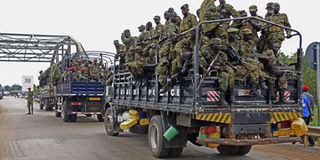AU approves regional force for South Sudan as thousands flee

Uganda military personnel drive towards Juba in South Sudan at Nimule border point on July 14, 2016. African Union has backed plans to deploy regional troops to crisis-hit South Sudan after fighting between rival forces left hundreds dead. PHOTO | AFP
What you need to know:
- Soldiers for the AU force are to come from Ethiopia, Kenya, Rwanda, Sudan and Uganda.
- A 12,000-strong UN peacekeeping force is already in South Sudan, but the AU force would have a stronger mandate, officials say.
- South Sudan’s government says it is opposed to the deployment of the force.
- Amnesty International has warned that South Sudanese security forces were preventing people from leaving the country.
JUBA
African leaders have backed plans to deploy regional troops to crisis-hit South Sudan after fighting between rival forces left hundreds dead.
This comes as the UN announced Tuesday that more than 5,000 people have fled to neighbouring Uganda since the fighting broke out on July 7.
Soldiers for the AU force are to come from Ethiopia, Kenya, Rwanda, Sudan and Uganda.
A 12,000-strong UN peacekeeping force is already in the country, but the AU force would have a stronger mandate, officials say.
South Sudan’s government says it is opposed to the deployment of the force. “We are not ready for a deployment of even a single additional soldier,” Information Minister Michael Makuei Lueth, told the BBC. “That does not solve the problem.”
President Salva Kiir and his rival, Vice-President Riek Machar, announced a ceasefire last week.
“The UN doesn’t have the mandate to impose peace,” AFP quoted AU Peace and Security Commissioner Smail Chergui saying at the AU summit in Rwanda’s capital, Kigali.
“They are there where there is peace to keep. African troops are ready to engage in very difficult situations.”
He explained that the mission would be similar to the deployment of a 3,000-strong special force that took on the M23 rebels in the Democratic Republic of Congo in 2013.
DEPLOY TROOPS
But Mr Lueth blamed the recent fighting on the peace deal which, he said, was imposed by regional mediators.
“As a sovereign state… this thing cannot be imposed on us without our consent,” he said, adding it would not “serve the interests of the people of South Sudan”.
President Kiir will be hoping that the AU shelves its plan to deploy troops as it did in the case of Burundi. So far the continental body has only sent in forces at the request of the state in need.
Theoretically it can intervene against a nation’s wishes, which is part of the remit of the new rapid-response African Standby Force.
The AU has a history of talking tough but so far has been unable to rein in problematic African leaders. It is also struggling to fund its operations.
The AU wants to model this new force on the Force Intervention Brigade sent to eastern DR Congo to battle rebel groups. That was a collaboration involving the AU, the UN and the Southern African Development Community.
The force defeated the M23 rebels after some 800,000 people had fled Mr Kiir’s troops make up the majority in and around the capital, Juba, contrary to the terms of the peace agreement.
So it would be a huge challenge for the AU force to attempt to call them to order, but it would provide a buffer to the outnumbered troops on Mr Machar’s side, whose whereabouts following the recent fighting remains unclear.
5,000 PEOPLE FLED
In Geneva, the UN said more than 5,000 people had fled to Uganda and voiced fears more could follow. An estimated 90 per cent of those who crossed the border in recent days were women and children, the UN refugee agency said.
The latest wave of people are mostly fleeing from the southern state of Eastern Equatoria, with others coming from Juba.
“UNHCR expects more to flee to Uganda,” the agency said in a statement, noting that the number of people now on the move had risen because the road between Juba and the Ugandan border had been cleared of checkpoints.
Amnesty International has warned that South Sudanese security forces were preventing people from leaving the country.
The London-based rights group said two airlines had been ordered not to carry South Sudanese nationals, especially men.
The border with Uganda was previously closed on the South Sudan side, but official restrictions had been eased.





